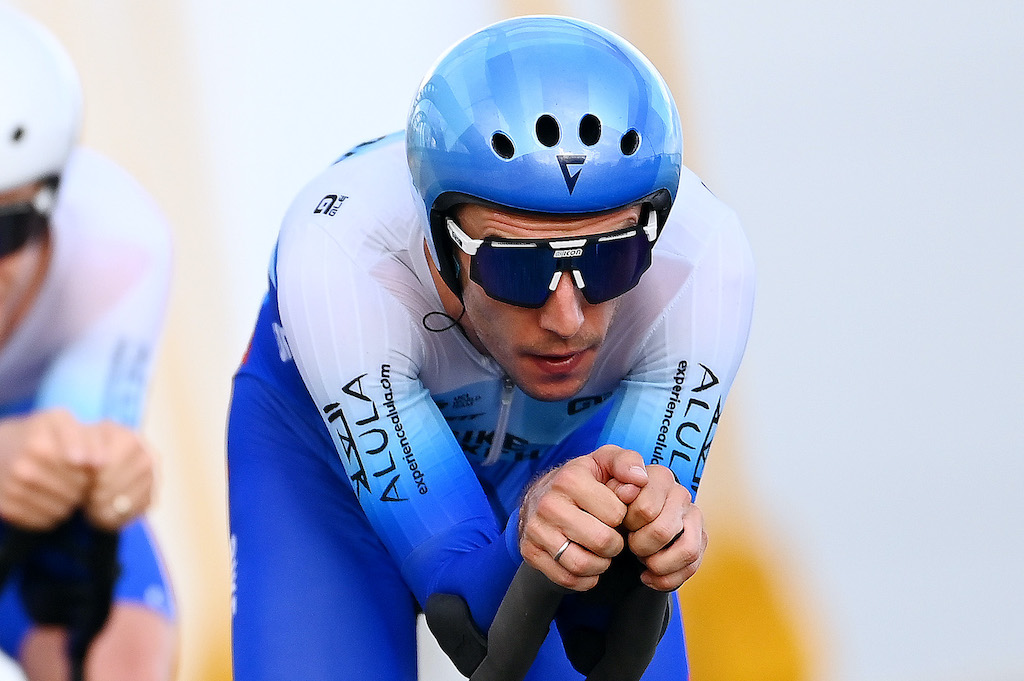Simon Yates pleased to have 'survived' tough opening stage at Vuelta a España
BikeExchange-Jayco finally fourth with 31-second time loss in TTT despite unfavourable weather conditions

BikeExchange-Jayco and team leader Simon Yates came through the opening time trial of the Vuelta a España with a genuine mixture of emotions as the team both emerged unscathed from some unpleasantly uneven weather conditions as provisional leaders, only to end the day with a time loss of 31 seconds on arch-rivals Jumbo-Visma and Primož Roglič.
That said, looking at the results sheet, the Australian squad and 2018 Vuelta a España winner are in a better place than a fair number of their rivals, and as Yates said afterwards, on a course rendered difficult by heavy rain showers, “we all survived and I think that’s the main thing.”
“It was a tricky start, the road was a little bit half-wet sometimes, you’d got into a corner and it’s just blind faith, you don’t know if it’s going to be wet or dry on the other side,” Yates told reporters afterwards.
“We almost had a couple of mishaps but luckily we all survived, so I think that’s the main thing, we got through and we can look forward to the rest of the race.”
BikeExchange-Jayco’s specialist time trial coach Marco Pinotti admitted that he had been hoping for more than a top-five placing, particularly given the amount of specific work for the TTT the Australian squad had put into one of the trickiest disciplines in the sport.
“I was hoping for a podium, and maybe a win,” Pinotti said. “But a couple of the teams were just stronger than us, so we’ll take away a couple of lessons learned and try to do better next time.”
His words were echoed by the team’s lead director at the Vuelta, Gene Bates, who also pointed out that the different weather conditions had not done the squad any favours, but that Jumbo-Visma had put in an excellent performance as well.
Get The Leadout Newsletter
The latest race content, interviews, features, reviews and expert buying guides, direct to your inbox!
“Jumbo were very good, there’s no denying that and they had the best conditions to start in, and rightfully so, as they brought last year’s leader so they had every right to start last,” Bates said.
The wet course for the teams that started early had played a role in how the riders tackled the course.
“It would have been nice to see what we could have produced under the best conditions,” Bates said.
“But the guys had a great ride and we look forward to the rest of the race. There were no major incidents, just a couple of little slips on corners, and sometimes we could have carried a little bit more speed out of those.
“But because of that wetness, there was a little bit more speed washed off going in and out, and that all adds up on a course that is 23 kilometres long.”
There are some notable time gaps for so early in a Grand Tour, even if by the end of three weeks they will barely be noted in the fully-formed GC. But Bates said he did not feel there would be any let-up in the fraught nature of the two flat stages to come all the same.
“The stress is going to be there in the next two days, given the potential for strong winds we’ve seen in Holland and the sprint finishes, plus you’ve got a fresh bunch coming into this," he said. “It’ll be hectic, even if you probably won’t see the GC guys coming out again now until stage 6 and the race’s first big summit finish.”
Alasdair Fotheringham has been reporting on cycling since 1991. He has covered every Tour de France since 1992 bar one, as well as numerous other bike races of all shapes and sizes, ranging from the Olympic Games in 2008 to the now sadly defunct Subida a Urkiola hill climb in Spain. As well as working for Cyclingnews, he has also written for The Independent, The Guardian, ProCycling, The Express and Reuters.
